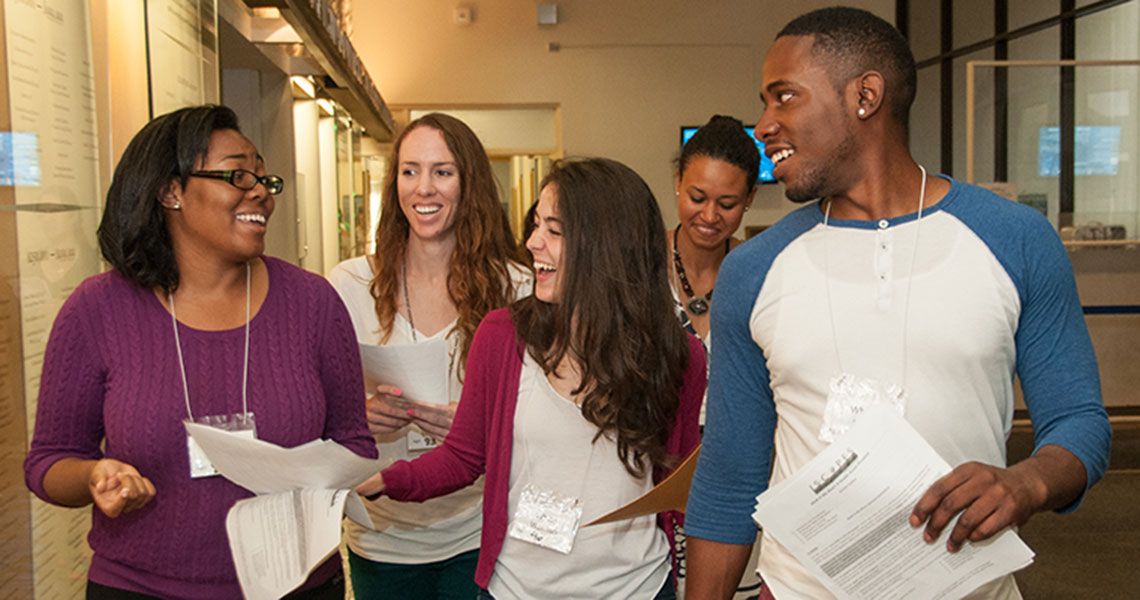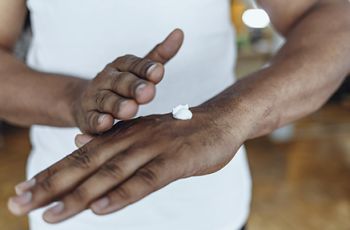Imagine taking a walk in the shoes of a 35-year-old homeless man living in Washington, D.C. who speaks only Spanish, as he tries to navigate the health care system to receive care for a chronic aliment. That was the challenge for Lauren Arbetman, a first-year medical student at the GW School of Medicine and Health Sciences (SMHS). “The most frustrating part for me was finding a doctor and waiting in line,” said Arbetman, who spent the entire time filling out forms and being shuffled from room to room during the annual “A Walk in My Shoes” simulation, Aug. 12. The language barrier was a huge obstacle for Arbetman. “I never got a straight answer about my health because no one wanted to take the time to deal with someone who couldn’t speak English.”
Arbetman was one of the 181 medical students from the SMHS M.D. Class of 2018 who participated in this simulation organized by GW’s Interdisciplinary Student Community-Oriented Prevention Enhancement Service (ISCOPES) program. The event gives first-year medical students the opportunity to navigate the health care system from the perspective of a community member who is uninsured or lacks resources and access to quality health care. This was the first year that all incoming medical students participated. The event is a foundational session of the Public Health and Health Policy and Diversity and Cultural Competency themes of the revised curriculum, made possible through a collaboration with ISCOPES and the SMHS Office of Diversity and Inclusion. More than 75 volunteers from SMHS, Unity Health Care Inc., Whitman-Walker Health, the GW Medical Faculty Associates, and Children's National Health System helped make this event possible; 17 of whom participated in an intensive training of their own in order to prepare them for the debrief/synthesis portion of the event.
Students are assigned an identity that includes race/ethnicity, age, language, occupational status, health issues, immigration status, and family situation. It is the student’s responsibility to obtain health care by traveling to various rooms representing emergency rooms, government offices, hospitals, clinics, work, and other community sites.
“The students witnessed and experienced the struggles thousands upon thousands of people in our country wrestle with in pursuit of the health care they need to survive,” said Angie Hinzey, M.P.H., CHES, director of ISCOPES. “What is so incredible about the event is that you get to see the frustration students experience when they, like so many others, have to deal with confusing forms/processes, wait in line for services they don't qualify for, address crises when they just finished figuring out the last challenge, balance competing interests, react to being treated unjustly, and feel for a moment what it is like to be invisible,” she said.
This year, Hinzey and her colleague, Donna Javellana, M.P.H., have been able to adapt the simulation to more accurately reflect the health insurance and health care systems in the D.C. metro area. “We’ve also updated the simulation to reflect all of the changes caused by the Affordable Care Act,” she said.
“In 45 minutes, these students get a snapshot of the realities of health disparities in D.C.,” said Grace Henry, Ed.D. director of the SMHS Office of Diversity and Inclusion. “It’s extremely important for our students to understand the patients that they will be serving.”
It was an eye-opening experience for Sandhya Patel, a first-year medical student at SMHS. “There were so many unknowns throughout the simulation and a complete lack of information when you needed it the most,” she said. “I saw a lot of people struggling with language barriers, unemployment, and finding the proper health care coverage.”
Patel’s experience is exactly what this exercise is all about, explained Hinzey. “Regardless of who people are when they begin this experience, we strive to ensure that when they leave their desire to become humble servants and health advocates is even stronger,” she said.



